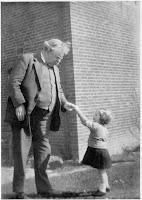 |
| Mature wisdom touches childlike wonder in The Everlasting Man. |
1 1/8th Top Review (233+ / 5-)
*****
This is a book that everyone ought to read two or three times at least. It is a crime that such nonsense as Conversations With God, or better but still relatively shallow introductions to comparative religion like Religions of Man, seem to be better known. Here you will find a description of Christianity and its relation to other faiths strong and fine as aged wine. I don't know of anyone who writes with this much class in the modern world. Having ordered the book for our college library, I tried not to mark it too much, but found myself putting ink dots on paragraph after paragraph of material I wanted to quote. He rambles a bit, but I think there is more wisdom, humor, and insight in a single page of this book than in whole volumes that are better known in our days. Imagine if, after reading David Barry and laughing your head off, you wanted to go out and kiss a blade of grass or be amazed by the water running in the river instead of (say) looking up at the sky to make sure there aren't any mackerel about to fall on you. G.K.Chesterton makes his readers laugh themselves sane. And sanity is a rare and wonderful thing in the modern world.
Chesterton's archeology and contemporary references are a bit dated, of course. But even there, what goes around often comes around. Chesterton leads off with a story about Grant Allen, author of a piece of heresy of that time called Evolution of the Idea of God. More recently Karen Armstrong wrote a book with an almost identical title and thesis, History of God, and was greeted in the press as a bold thinker. (Note: Robert Wright's subsequent The Evolution of God would continue the theme, also to be found in rather different forms in Dawkins, Pascal Boyer, and Daniel Dennett.) Chesterton kindly and elegantly refuted her error, and those of other modern skeptics, decades before they were born. Admirers of Bishop Spong in particular should read this book. Chesterton was not a scholar of comparative religions, of course, and he may have oversimplified a few things, but I think got the big things in true proportion better than anyone. The plan of the book is simple. In the first half, Chesterton describes man, particularly in his religious aspect. In particular, he explains four universal elements of human religion: mythology, philosophy, demonism, and an awareness of God that one finds in almost every culture around the world. The tendency in the modern world is to ignore the last two elements when they occur outside of Western culture. But I have found in my own studies of Asian cultures and religions that Chesterton's description of human religion fit the facts extremely well. The second half of the book is about Jesus and the movement he founded. I like what he says about Jesus best, and wish he had spent more time on that and proportionally less on European culture. A few of his racial or cultural assumptions do not come across well in our age. It is worth remembering how the face of Christianity has changed over the hundred years since this book was published. Then Christianity was almost exclusively a Western religion, while now two thirds of the believers in the world live in Africa, Latin American and Asia.
If you are interested in a more detailed discussion of some of the points Chesterton brings up, I suggest Don Richardson's Eternity in Their Hearts, another of the most overlooked works of the 20th Century. I have also just written a book called Jesus and the Religions of Man, that covers in more detail some of the same territory.
Note: I first posted this review in June of 2000; it remains among the highlighted reviews on Amazon. I've added a few updates, here.
No comments:
Post a Comment